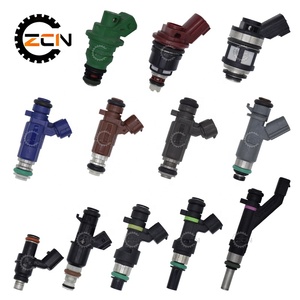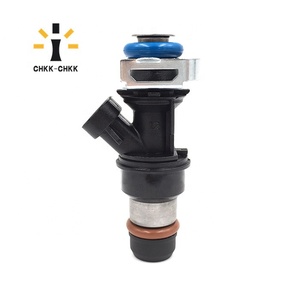(2331 products available)






















































































































































































General Motors (GM) vehicles rely on fuel injectors to provide the right air-fuel combination for optimal engine performance. The GM injector directs fuel into the combustion chamber or intake manifold in various types, depending on the vehicle model and engine type.
Port Fuel Injectors
Port fuel injectors are the most widespread fuel injector types used in gasoline engines. They spray fuel directly into the intake port, mixing it with air before entering the combustion chamber. This allows for precise control of the air-fuel mixture, ensuring efficient combustion and engine performance. Port fuel injectors are responsible for reducing emissions while offering better throttle response and power output.
Direct Injectors
Direct injectors are another common type used in modern GM engines, especially those with high performance. Unlike port fuel injectors that spray fuel into the intake air stream, direct injectors inject fuel directly into the combustion chamber. This allows for better control of the air-fuel mixture and combustion process, resulting in higher power output, better fuel efficiency, and lower emissions. Direct injection technology is predominantly used in turbocharged and high-performance GM engines.
Dual Fuel Injection
Some high-performance GM vehicles use a combination of port and direct fuel injection. These dual fuel injection systems leverage the benefits of both injector types. During normal driving conditions, port fuel injectors provide smooth operation and good fuel efficiency. Under high load or boost conditions, direct injectors deliver additional fuel for increased power and performance. This dual approach optimizes fuel delivery, ensuring drivability, fuel economy, and performance in a single package.
Diesel Fuel Injectors
While most discussions around fuel injectors revolve around gasoline engines, diesel engines also utilize fuel injectors. Diesel fuel injectors atomize diesel fuel and inject it directly into the combustion chamber. The high temperatures and pressures in the chamber cause the diesel fuel to ignite spontaneously without requiring a spark plug. Diesel fuel injectors are designed to withstand the harsher conditions of diesel combustion, ensuring reliable fuel delivery in GM diesel-powered vehicles.
High-Performance Aftermarket Fuel Injectors
For enthusiasts looking to extract more power from their GM vehicles, aftermarket fuel injectors can provide the solution. High-performance aftermarket fuel injectors offer higher flow rates to support increased fueling demands in modified engines. They ensure a consistent and precise air-fuel mixture, even at higher power levels, making them suitable for performance upgrades, turbocharging, or supercharging applications. These fuel injectors are engineered to handle the rigors of track or racing conditions, delivering reliability and performance.
Specifications of GM fuel injectors include the following:
Injector flow rate
It tells how much fuel the injector can deliver to the engine in a given time period. For example, an injector with a flow rate of 30 pounds per hour can deliver 30 pounds of fuel every hour. Higher flow rates allow for more fuel delivery to support increased power output or fuel demands.
Injector impedance
It shows the electrical resistance of the injector coils. Low-impedance injectors have around 2 to 3 ohms of resistance, while high-impedance injectors have 12 to 16 ohms. Low-impedance injectors provide faster and more precise fuel metering but require special drivers to control them.
Injector spray pattern
GM fuel injectors come with cone-shaped, hollow, or multi-hole nozzles that help in breaking the fuel into small droplets. The size and angle of the spray are important as they influence how well the fuel mixes with air before entering the combustion chamber. A proper spray pattern ensures efficient combustion and optimized engine performance.
Injector nozzle size
It refers to the diameter of the opening through which fuel is injected into the engine's combustion chamber. A larger nozzle size allows for higher fuel flow rates, supporting increased power output or fuel demands in high-performance applications. Smaller nozzle sizes provide finer atomization and better fuel metering for lower power requirements.
Fuel type compatibility
GM fuel injectors are designed to work with specific types of fuel, such as gasoline or diesel. Each injector type is engineered to handle the characteristics of the fuel it uses. For example, diesel fuel injectors operate at higher pressures than gasoline injectors to atomize the heavier molecules in diesel fuel.
GM fuel injector maintenance requirements include the following:
Regular inspections
GM vehicle owners should routinely check their fuel injectors for signs of damage, wear, or leaks. They should also examine associated components like fuel lines and rail assemblies. Early detection of issues through visual inspections helps prevent injector failure and minimizes potential engine performance problems.
Fuel system cleaning
Over time, deposits and contaminants can accumulate inside fuel injectors, affecting their performance and fuel delivery precision. To counter this, car owners can use fuel additives or professional cleaning services to remove these deposits and restore injectors' optimal functionality.
Using quality fuel
Vehicle owners should use high-quality fuel that meets GM's specifications. Avoiding fuels with lower quality or subpar additives helps maintain the cleanliness and performance of the fuel injectors. Clean fuels prevent deposit formations and ensure consistent fuel delivery to the engine.
Replace fuel filters
GM vehicle owners should change their fuel filters as recommended by the manufacturer. A clean fuel filter prevents contaminants from reaching the injectors, reducing the risk of clogging or damage. By maintaining a clean fuel system, injectors can function optimally, promoting efficient fuel atomization and distribution.
There are several factors to consider when selecting a GM fuel injector for resale, including understanding the target market, availability, and compatibility.
Understanding the target market is crucial. Determine whether the target customers are performance enthusiasts or regular car owners. Performance enthusiasts may focus more on high-flow fuel injectors to improve their engine's performance. In contrast, regular car owners may want fuel injectors that match the stock specifications.
Consider the fuel injector flow rate when choosing a GM fuel injector for resale. Stock fuel injectors have a low flow rate. On the other hand, high-performance fuel injectors have a higher flow rate, allowing more fuel to enter the combustion chamber. Resellers should ensure that the flow rate of the fuel injectors matches the needs of the target market.
Another factor to consider is the fuel injector type. While there are several types of fuel injectors, one should focus on the most common ones, such as the Delphi fuel injector. Besides, choose the right fuel injector nozzle type. Nozzle types vary depending on the fuel injector type. Common nozzle types include single and multiple nozzles.
Additionally, consider the fuel injector voltage. Most fuel injectors operate on 12v, but there are a few that operate on 24v. Resellers should ensure that the fuel injectors are compatible with the target customers' vehicles.
Above all, prioritize quality when choosing a fuel injector for resale. Working with reputable suppliers will ensure that one gets high-quality products. Consider the warranty offers from the suppliers to be sure that the products are durable.
It is necessary to get a professional to replace GM diesel fuel injectors. However, it is possible to replace them as a DIY project. Ensure to have the right tools and parts before starting the project. The tools needed are:
Once the tools are ready, follow the steps below to replace the injectors.
Q1: What is a GM fuel injector cleaning kit?
A1: A GM fuel injector cleaning kit is a tool used to clean fuel injectors in GM vehicles. It typically contains a cleaning solvent, a cleaning adapter that connects to the fuel rail or injector ports, and sometimes additional tools for injector removal. Using this kit helps remove carbon deposits and buildup from fuel injectors, restoring proper spray patterns and improving engine performance.
Q2: What is the difference between the GM 350 and 383 engines regarding fuel injectors?
A2: The fuel injectors for GM 350 and GM 383 engines are mostly similar. They are both small-block Chevy engines with identical injector specifications. However, the GM 383 engine has a higher displacement of 383 cubic inches (6.3 liters) compared to the 350's 350 cubic inches (5.7 liters). As a result, the GM 383 engine may require slightly larger fuel injectors to support its higher power output potential. When considering a fuel injector replacement or upgrade, consult the manufacturer's recommendations based on engine specifications and performance goals.
Q3: Can damaged or worn-out fuel injectors be repaired?
A3: Once a fuel injector has a mechanical fault, it cannot be repaired. However, it can be cleaned using a GM fuel injector cleaning kit, and its performance can be restored. Nevertheless, cleaning cannot guarantee full restoration. Therefore, replacing old fuel injectors is the best solution.
Q4: How long does it take to replace a fuel injector?
A4: Replacing a fuel injector is a time-consuming task. It can take anywhere from an hour to several hours, depending on the car model. For instance, replacing fuel injectors in an engine with easy access to the injectors is quicker. However, in a case where the fuel injectors are seated deep within the engine, accessing and replacing them will take several hours.
Q5: What is the warranty period for a fuel injector?
A5: Most fuel injectors from various suppliers on Chovm.com have a warranty period of one year. However, some suppliers offer a warranty period of up to three years. Be sure to check the warranty conditions and claim procedures.
The keyword "gm injector" has shown a fluctuating search trend over the past year, with an average monthly web search volume of 90. Despite a three-month decrease of 18%, the year-long trend demonstrates a significant 29% increase in web search volume. This pattern is evident from monthly data ranging from December 2023 to November 2024.
Analyzing the monthly search data for "gm injector," we notice a pattern of alternating web search volumes. For instance, after starting at 70 web searches in December 2023, the volume increased to 90 in January 2024, dipped back to 70 in February, and again rose to 90 in March. This oscillation between 70 and 90 web searches continued until a noticeable peak at 110 web searches in July and September 2024. The data suggests a slight seasonal influence, with peaks typically occurring in mid-year and mid-fall.
The web search volume trend for "gm injector" reflects a blend of stable interest and periodic spikes. The consistent return to higher web search volumes (90 and above) despite brief declines indicates a solid baseline demand. The periodic peaks, particularly noticeable in July and September, might suggest seasonal influences, possibly aligned with vehicle maintenance cycles or specific market events affecting interest in vehicle parts and accessories.